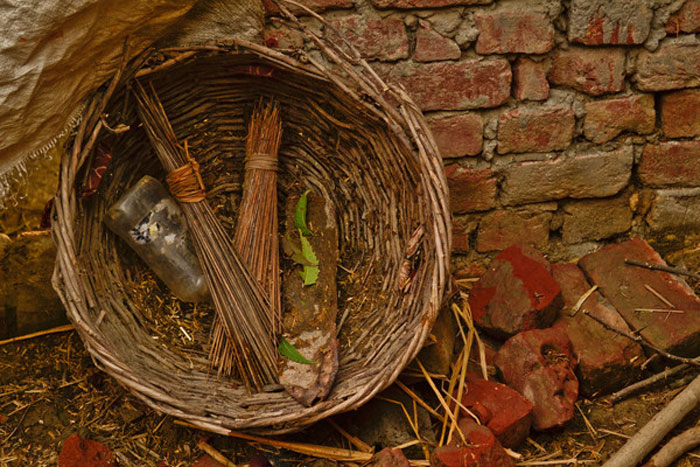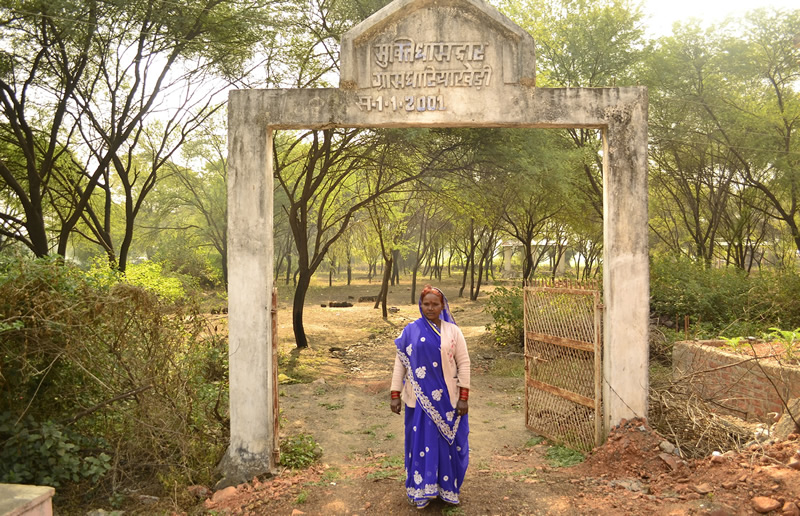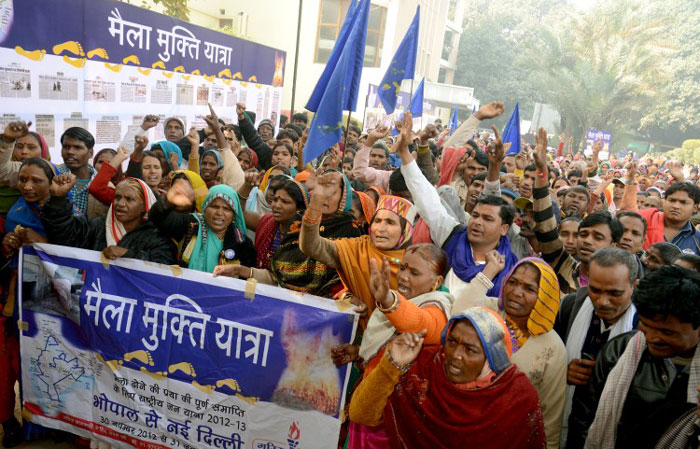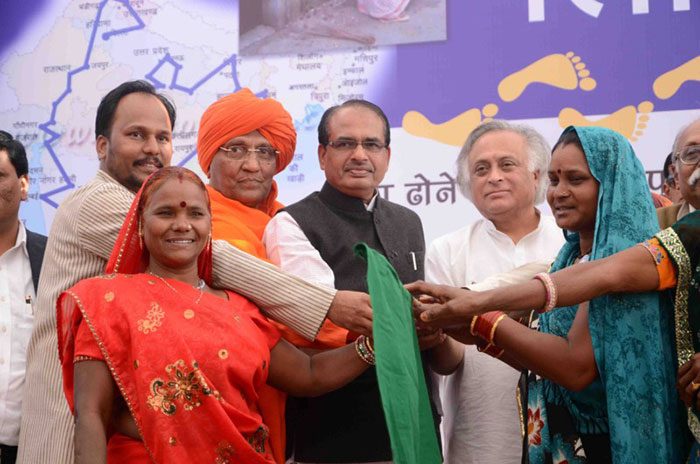A decade ago, Lalibai, then a mother of four, took a stand and refused to remove and dispose of excrement from her village’s dry toilets, work she inherited at age 12. She had been approached by grassroots activists who said it was illegal for anyone to compel her to do this work, and that she had a choice to leave. She decided to claim her dignity and quit.
It’s hard to imagine that powerfully outspoken Lalibai, with her henna-red hair and upright posture, had once accepted cleaning human waste as her life’s duty. Each day she would carry her cane basket from house to house, lift the waste from latrines, and carry it outside the village. She hated carrying waste, found it disgusting, and it was making her physically sick. She was “paid” with stale roti, a flat bread. This job was customarily designated to her community, considered a low-ranking caste. She could not fathom any other life.

Across India today, people from some communities that are considered low-caste “untouchables,” or Dalits, are expected to practice “manual scavenging,” the collection and disposal of human waste. They face significant barriers to leaving this role, including those imposed by local government officials, a new Human Rights Watch report shows. This work takes many forms. Women from this caste usually clean dry toilets in homes, while men do the more physically demanding cleaning of sewers and septic tanks. They are expected to clean open defecation from areas including streets and fields each morning.
India has long had laws in place banning manual scavenging and, more recently, supporting people to leave it. But caste designations are so entrenched that when people try and leave they may not be hired to work elsewhere, may be threatened with displacement from the village, and in extreme cases, may even face physical violence. All too often the local authorities ignore or even take part in this discrimination.
India’s manual scavengers at work.
Lalibai’s parents had her married off at age eight, at which time she moved away from her home state of Rajasthan to Madhya Pradesh. At 12, her mother-in-law passed down to her the traditional job of manual scavenging.
People from her caste were “untouchable” in the eyes of the other villagers. She was forbidden from handling vegetables at the market and from taking water from the village tap. No one would cut her hair, and if she attempted to pray at a temple, she would be turned away. Her caste was forbidden to have wedding processions or even music and dancing at weddings. When walking into the village, women were forced to go barefoot and wear distinctive clothing that identified their caste.
In 2002, Lalibai met the activists from the Rashtriya Garima Abhiyan – the National Dignity Campaign – and decided to quit collecting excrement. “I liberated myself,” she likes to say. But the people around her didn’t see it that way. “People from the houses where I used to clean would come to my house every day for months and demand that I return to this work,” Lalibai said.
Lalibai regularly traveled to attend activist meetings, and when she stood at the tempo stand waiting for a ride, an elderly upper-caste man who lived nearby would warn her not to challenge her caste-designated role. “He would taunt me, and even told me that if I kept going this way, one day I would not return home,” Lalibai explained. “It is hardest to change the minds of the eldest people in our village.”
For Lalibai, one of her greatest victories was securing the right to access the village’s cremation grounds for people from her caste. People who worked as manual scavengers were forbidden from using them, despite the importance of last rites in Indian life. Most had to ask permission of landowners to burn their dead in fields; some burned their dead in tires on the road.

Lalibai’s father-in-law passed away in 2003, and she wanted to perform the last rites ceremony in the village cremation grounds. Her family hoped to overwhelm tradition with numbers, and a group of 100 people – both from their village and other villages – accompanied them to the grounds. But several men considered to be higher caste met them on the road, threatening violence if they proceeded. They chose instead to burn his body in a field.
When her mother-in-law passed away in 2011, Lalibai’s family was again stopped from burning her body in the village cremation grounds. This time she fought back. She chose to cremate her mother-in-law in the fields of one of the people who had turned her away from the cremation grounds years before. The field’s owner reported her to the authorities.
Still she fought, this time together with an organization dedicated to ending caste-based discrimination, Jan Sahas (People’s Courage). Legally, these grounds were also hers to use. “We made a video showing that we had nowhere to cremate our dead and filed a police complaint against the village council leader for discriminating against us,” she said. Within eight days, the case against Lalibai was withdrawn.
She spoke with pride when she said that the next time a man from her caste died, the village council leader accompanied them to the cremation grounds to ensure that they could do the last rites without harassment.
“Any time untouchability is practiced, I raise my voice and fight against it,” she said. “There is no end. It starts from the house to the market to the water pumps.”
The stories of India’s manual scavengers.
Over the next decade, Lalibai grew into her role. She has helped liberate 163 other women from manual scavenging. “I make them understand how I left the work, and I say, ‘Now you can also leave it.’” She helps them to resist pressure to return to manual scavenging by encouraging women to form support groups and stand together against any harassment they face.

In 2012, Lalibai helped organize a march of 10,000 women who had left manual scavenging that traveled through 18 Indian states. Their goal: to share the message of their freedom with 50,000 other people from their caste and show that it was possible to break out of excrement cleaning. The march ended in Delhi, India’s capital, where the women knocked on the doors of lawmakers, ultimately helping push forward a new, stronger law in 2013 that provides assistance to those leaving manual scavenging.
But the constant activism has taken a toll on Lalibai. Her vulnerability is only caught in glimpses, but it’s there when she speaks of the death of her 20-year-old daughter-in-law, Bina Bamma. In a community where daughters-in-law are handed a basket to clean human excrement upon marriage, Lalibai refused to pass the burden of scavenging work onto her. She broke the cycle. Then, Bina Bamma fell dangerously ill while Lalibai was planning the march, and it threw Lalibai into a situation where she could no longer change the course of Bina’s life. Lalibai’s family took Bina Bamma to the hospital. She never received a diagnosis, but passed away 15 days later.
“She was very young,” Lalibai said. “Not the age to die.”
As Lalibai told this story, her voice never changed, but tears ran down her face. In a community where daughters-in-law can be perceived as having little value and are handed a basket to clean human excrement upon marriage, Lalibai chose to refer to Bina Bamma as “daughter.” She refused to pass the burden of scavenging work onto her. She broke the cycle.

Despite her growth into a prominent activist, Lalibai and her community still face discrimination in her village. She doesn’t like to attend village council meetings because of the shame she feels in not being allowed to drink water from a cup like the others, and in being made to sit on the floor rather than on rugs. The elected village council leaders do not let her speak in the meetings.
At first after quitting manual scavenging, Lalibai earned a living working in slate mines and in the fields, like many of India’s rural poor. Now, she works fulltime for Rashtriya Garima Abhiyan to free other women from manual scavenging. At the launch of the 10,000-woman march she helped to organize, Lalibai and other activists stood on stage with the then rural development minister and the chief minister of Madhya Pradesh. Everyone onstage put their hands together to hold the flag they would wave to send off the march. For a woman forbidden from touching fruit at her village market, it must have felt like an important victory not only to push forward a new law, but also to literally join hands with government ministers in the struggle to end manual scavenging.